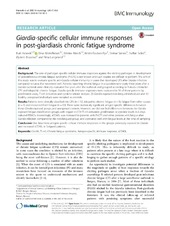| dc.contributor.author | Hanevik, Kurt | en_US |
| dc.contributor.author | Kristoffersen, Einar | en_US |
| dc.contributor.author | Mørch, Kristine | en_US |
| dc.contributor.author | Rye, Kristin Paulsen | en_US |
| dc.contributor.author | Sørnes, Steinar | en_US |
| dc.contributor.author | Svärd, Staffan | en_US |
| dc.contributor.author | Bruserud, Øystein | en_US |
| dc.contributor.author | Langeland, Nina | en_US |
| dc.date.accessioned | 2017-02-01T07:45:23Z | |
| dc.date.available | 2017-02-01T07:45:23Z | |
| dc.date.issued | 2017-01-28 | |
| dc.identifier.issn | 1471-2172 | |
| dc.identifier.uri | https://hdl.handle.net/1956/15493 | |
| dc.description.abstract | Background: The role of pathogen specific cellular immune responses against the eliciting pathogen in development of post-infectious chronic fatigue syndrome (PI-CFS) is not known and such studies are difficult to perform. The aim of this study was to evaluate specific anti-Giardia cellular immunity in cases that developed CFS after Giardia infection compared to cases that recovered well. Patients reporting chronic fatigue in a questionnaire study three years after a Giardia outbreak were clinically evaluated five years after the outbreak and grouped according to Fukuda criteria for CFS and idiopathic chronic fatigue. Giardia specific immune responses were evaluated in 39 of these patients by proliferation assay, T cell activation and cytokine release analysis. 20 Giardia exposed non-fatigued individuals and 10 healthy unexposed individuals were recruited as controls. Results: Patients were clinically classified into CFS (n = 15), idiopathic chronic fatigue (n = 5), fatigue from other causes (n = 9) and recovered from fatigue (n = 10). There were statistically significant antigen specific differences between these Giardia exposed groups and unexposed controls. However, we did not find differences between the Giardia exposed fatigue classification groups with regard to CD4 T cell activation, proliferation or cytokine levels in 6 days cultured PBMCs. Interestingly, sCD40L was increased in patients with PI-CFS and other persons with fatigue after Giardia infection compared to the non-fatigued group, and correlated well with fatigue levels at the time of sampling. Conclusion: Our data show antigen specific cellular immune responses in the groups previously exposed to Giardia and increased sCD40L in fatigued patients. | en_US |
| dc.language.iso | eng | eng |
| dc.publisher | BioMed Central | eng |
| dc.relation.ispartof | <a href="http://hdl.handle.net/1956/15491" target="_blank">Post-giardiasis functional gastrointestinal disorders and chronic fatigue syndrome – clinical symptoms, inflammation and immune responses</a> | eng |
| dc.rights | Attribution CC BY | eng |
| dc.rights.uri | http://creativecommons.org/licenses/by/4.0 | eng |
| dc.subject | Giardia | eng |
| dc.subject | T cell | eng |
| dc.subject | Chronic fatigue syndrome | eng |
| dc.subject | Antigen-specific | eng |
| dc.subject | Immune response | eng |
| dc.subject | sCD40L | eng |
| dc.title | Giardia-specific cellular immune responses in post-giardiasis chronic fatigue syndrome | en_US |
| dc.type | Peer reviewed | |
| dc.type | Journal article | |
| dc.description.version | publishedVersion | en_US |
| dc.rights.holder | Copyright 2017 The Author(s) | |
| dc.source.articlenumber | 5 | |
| dc.identifier.doi | https://doi.org/10.1186/s12865-017-0190-3 | |
| dc.source.journal | BMC Immunology | |
| dc.source.40 | 18 | |

